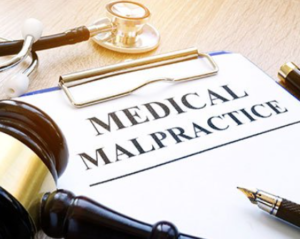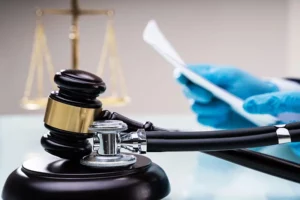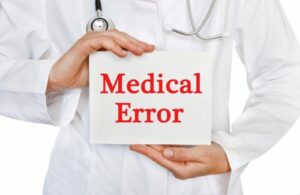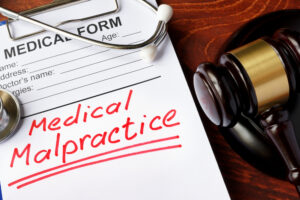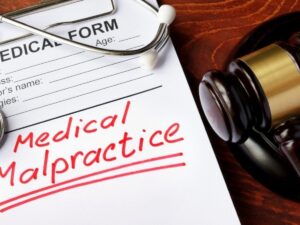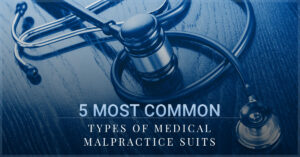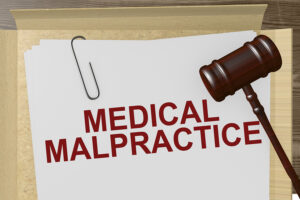WHEN DO MEDICAL MISTAKES GIVE YOU THE RIGHT TO SUE FOR MALPRACTICE?
You trust your doctor and other health care providers to provide skilled care for you and your family. Unfortunately, tragic mistakes do happen.
CNBC cites studies that indicate medical mistakes in the U.S. may result in 250,000 to 440,000 deaths each year. Researchers at the Johns Hopkins University School of Medicine determined that medical mistakes may be the third leading cause of death in the U.S.
However, researchers believe officials underreport fatalities caused by medical mistakes. Johns Hopkins points to several factors that contribute to medical mistakes. Patients may suffer harm from inconsistent practices, a lack of coordination among caregivers, disjointed insurance systems, and inadequate safety nets.
If you or a loved one has been injured due to a medical error, you may wonder whether you have the right to pursue a lawsuit for medical malpractice. To prove a medical malpractice claim, you must establish that your healthcare practitioner failed to meet the relevant professional standards of care and that their failure caused your injury or illness, which resulted in significant damages.
DID YOUR HEALTHCARE PROVIDER VIOLATE THEIR DUTY OF CARE?
The first hurdle in determining whether you may have a malpractice claim is to ask whether your healthcare practitioner complied with applicable medical and legal standards. Did your practitioner exhibit the competence you could reasonably expect from a similarly educated and credentialed professional? You would not schedule knee replacement surgery with a dermatologist, but you can reasonably expect that an orthopedic surgeon can competently handle such a procedure.
Some cases may present clear examples of medical negligence. A surgeon operates on a healthy right wrist instead of an injured left wrist. A heart surgeon leaves a sponge behind after bypass surgery. A plastic surgeon attempts a procedure while under the influence of drugs or alcohol. The facility that employs the person who made the error may also be legally responsible for the mistake. For example, a facility might employ a nurse who administers a medication overdose.
Other cases are not as obvious. An oncologist can help cancer patients manage their disease, but cannot guarantee recovery. If a patient takes a turn for the worse, it may be difficult to determine whether medical negligence occurred or whether the patient’s disease naturally progressed.
MISTAKES CAN INCLUDE MISDIAGNOSIS OR A FAILURE TO INFORM
Proper medical treatment must start with an accurate diagnosis. However, a recent study reports that diagnostic errors contribute to most medical malpractice claims. A doctor may fail to order appropriate tests, or a laboratory may mishandle a blood sample. Your family doctor may overlook the need to refer you to a specialist who can pinpoint the source of your pain.
A health professional’s duty extends beyond accurate diagnosis and competent care. Most procedures carry some inherent risk, and you have the right to expect that your physician will disclose the risks and benefits of treatment before you consent to it. For example, the orthopedic surgeon handling your knee replacement should advise you if your body may reject the implant. When you understand a procedure’s risks, you can give informed consent to the treatment plan. Doctors may be negligent if they violate their medical or legal obligations to inform patients of possible poor outcomes.
YOUR DOCTOR MADE A MISTAKE. NOW WHAT?
You may be confident that your doctor made a mistake or did not provide competent care. Does that mean you can initiate a lawsuit for medical malpractice? Not necessarily. You must also establish that the mistake or negligence caused you injury that would not have occurred in the absence of the mistake or negligence.
Suppose a radiologist misreads an X-ray and fails to note your broken wrist. The ongoing pain compels you to get a second opinion that reveals your injury. If your physician then properly treats the wrist, you may not have suffered an actionable injury. Or, if your doctor prescribes an incorrect dose of painkillers but the pharmacist notices the mistake and gives you the correct dose, you have not suffered an injury because of the doctor’s error. You may feel rightfully angered by a provider’s mistake, but you must connect the mistake to an injury to have a malpractice claim.
DAMAGES YOU CAN SEEK IN A MEDICAL MALPRACTICE CASE
If you establish that a medical provider’s mistake or negligence caused your injury, you must then gather proof of the significant damages you have sustained to pursue a medical malpractice claim.
You may have suffered both economic and non-economic damages.
Examples include:
- Healthcare mistakes may result in crushing medical bills that pose financial hardships. You should gather bills and receipts for all your medical expenses. These may include office visits, X-rays and other images, laboratory tests, surgical procedures, medications, hospital stays, and physical therapy or rehabilitation. Your injury might require follow-up care and treatment, and you may have a claim for anticipated future expenses.
- You may have a claim for reduced past and future earnings. Perhaps you took time off from work to recover. Your injury may also impair your ability to return to work in the same capacity or hold steady employment in the future.
- Medical mistakes can result in pain and suffering that impact your mental health. You may have the right to seek compensation for that pain and suffering. If the mistake caused a disability or disfigurement, you may experience depression, anxiety, or other mental health consequences for which you can also recover damages. You may wish to keep a journal to document the emotions you feel because of your injury.
An attorney with experience handling medical malpractice cases can help evaluate and determine the nature and amount of damages you may claim.
PUTTING TOGETHER THE PIECES OF A MALPRACTICE CASE
You likely need guidance from an experienced malpractice attorney to determine the viability of your claim. A lawyer can help gather a team of experts to evaluate the health care you receive. These experts can review your medical records and identify steps in diagnosis and treatment where your provider may have made mistakes. With this information, your legal team can assess whether the mistakes or inadequate care caused your injury, and, if so, your team can evaluate and calculate potential damages.
Medical Malpractice Lawyer, Yale Spector
You must also be aware that a malpractice claim may be subject to a statute of limitations. This means that you must file a claim before a specified deadline to preserve your rights. A lawyer can help you take timely action.
The U.S. Department of Health and Human Services suggests that you can reduce the risk of medical errors by actively participating in health care decisions. Demand that your doctor communicate with you in a timely and clear manner, and do not hesitate to ask questions.
If you have any doubts about a diagnosis or treatment plan, seek a second opinion. You may wish to invite family members to join you for appointments. Being informed and involved in your own healthcare may help protect you from medical malpractice. Hiring a medical malpractice lawyer can protect your rights and help you recover compensation should a doctor or other healthcare professional injure you.
Spector Law Group




